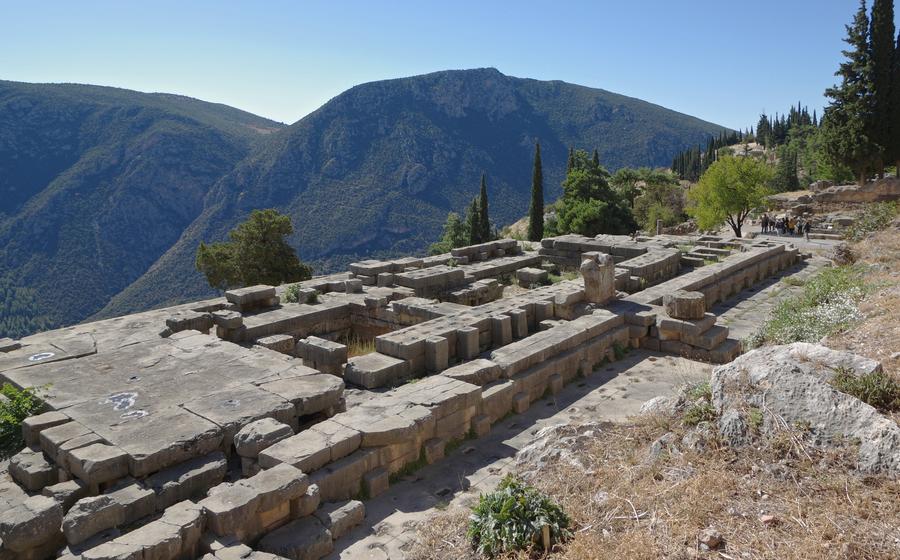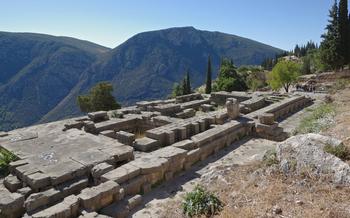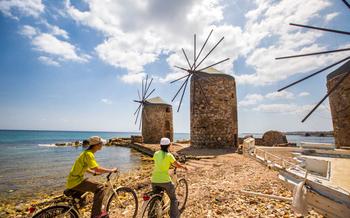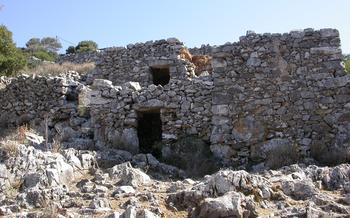
The Olive Museum of Kalamata
- The Olive Museum of Kalamata: An Overview
- A Journey Through Olive History
- Olive Varieties and Cultivation
- The Art of Olive Oil Production
- Health Benefits of Olive Oil: A Cornerstone of Well-being
- Olive Oil in Greek Cuisine
- The Olive Harvest: A Seasonal Celebration
- Olive Oil as a Cultural Symbol
- Sustainable Olive Farming Practices
- Olive Oil Quality Standards
- Local Artisans and Olive Oil Products
- Olive Oil Masterclasses and Workshops
- Learning from the Experts
- Creating Your Own Olive Oil Blends
- Cooking Classes with Olive Oil
- Olive Oil Tourism in Kalamata
- The Olive Museum Shop: A Treasure Trove of Olive Oil-Related Products
- Insider Tip: Hidden Gems Off the Beaten Path
The Olive Museum of Kalamata: An Overview
Nestled in the heart of Kalamata, a city renowned for its olive oil production, the Olive Museum stands as a testament to the rich cultural and culinary heritage of this liquid gold. Established in 2003, the museum offers a captivating journey into the world of olives, providing visitors with a comprehensive understanding of their significance in Greek history, cultivation, and gastronomy.
Situated within walking distance from Kalamata's central square, the museum is housed in a beautifully restored neoclassical building. Upon entering, visitors are greeted by a serene courtyard adorned with olive trees, setting the stage for an immersive experience. Interactive displays, informative panels, and multimedia presentations guide visitors through the various aspects of olive cultivation, production, and consumption, making it an ideal destination for both olive enthusiasts and casual visitors alike.
A Journey Through Olive History
Olive cultivation has deep roots in Greek history, dating back to the Minoan civilization over 4,000 years ago. Ancient Greeks recognized the olive tree's significance, considering it a sacred symbol of wisdom, peace, and prosperity. Olive oil was a staple in their diet, used for cooking, cosmetics, and religious rituals.
Over the centuries, olive oil production techniques evolved, influenced by various cultures and innovations. In the Byzantine era, olive oil presses powered by animals or watermills became widespread, increasing efficiency and production. During the Ottoman period, olive cultivation expanded, and new varieties were introduced.
The 19th century marked a turning point, with the introduction of modern machinery and standardized production methods. However, traditional techniques, such as stone mills and hand-picking, are still practiced in many regions, ensuring the preservation of cultural heritage and the unique characteristics of local olive oils.
Olive Varieties and Cultivation
In the heart of Messinia, the land of Kalamata, olive trees thrive in abundance. Greece is home to a diverse array of olive varieties, each with its unique characteristics and flavors. Kalamata olives, renowned for their rich, fruity taste and deep purple hue, are a testament to the region's rich olive-growing heritage.
Olive Varieties of Greece
Greece boasts over 100 varieties of olives, each adapted to specific microclimates and soil conditions. Among the most prominent are the Koroneiki, the most widely cultivated variety in the country, known for its high oil yield and delicate flavor. The Athinolia, with its medium-sized fruit and intense aroma, is prized for its resistance to pests and diseases. The Megaritiki, a variety native to Attica, produces large, fleshy olives with a sweet, nutty flavor.
Kalamata Olives: A Culinary Gem
Kalamata olives, undoubtedly the region's most celebrated variety, are characterized by their elongated shape, dark purple color, and distinctive almond-like flavor. They are grown exclusively in the Kalamata region, where the unique combination of soil, climate, and traditional cultivation practices gives them their exceptional quality.
Cultivation Practices: A Legacy of Tradition
Olive groves in Kalamata are a testament to the region's deep-rooted connection to olive cultivation. The trees, often centuries old, are lovingly tended by local farmers who have passed down their knowledge and traditions from generation to generation. Sustainable practices are prioritized, with an emphasis on preserving the natural balance of the ecosystem. Agroforestry techniques, such as intercropping with aromatic herbs and wildflowers, promote biodiversity and enhance soil health.
The Art of Olive Oil Production
Olive oil production in Kalamata is a blend of tradition and modernity, where time-honored techniques converge with contemporary technology. Traditional methods, passed down through generations, involve harvesting olives by hand, pressing them using stone mills, and extracting the oil naturally. This artisanal approach preserves the oil's integrity and distinctive flavor. Modern technology, on the other hand, has introduced centrifugal and continuous extraction systems, increasing efficiency while maintaining high-quality standards.
At the heart of Kalamata's olive oil production are cooperatives, playing a crucial role in preserving local traditions and supporting small-scale farmers. These cooperatives collect olives from their members, ensuring fair prices and promoting sustainable practices. They also oversee the entire production process, from harvesting to bottling, guaranteeing the authenticity and quality of the final product.
Olive oil tasting is an integral part of the Kalamata experience. Visitors can indulge in sensory explorations at local olive oil mills or specialized tasting rooms. Guided by experts, they learn to appreciate the nuances of different olive varieties, identifying flavor profiles and aromas that range from fruity and peppery to buttery and nutty. These tastings offer a deeper understanding of Kalamata's liquid gold and its intricate production process.
Health Benefits of Olive Oil: A Cornerstone of Well-being
Olive oil has long been recognized for its exceptional health benefits, earning its reputation as a cornerstone of the Mediterranean diet. Extensive scientific research has provided compelling evidence supporting the positive impact of olive oil on overall health and well-being.
The monounsaturated fatty acids, primarily oleic acid, present in olive oil play a crucial role in reducing the risk of cardiovascular diseases. They help lower LDL (bad) cholesterol while maintaining or increasing HDL (good) cholesterol levels, improving the overall lipid profile and promoting heart health.
Olive oil also exhibits anti-inflammatory properties, contributing to the reduction of inflammation throughout the body. Chronic inflammation is linked to various health conditions, including heart disease, stroke, type 2 diabetes, and certain types of cancer.
Moreover, olive oil contains a wealth of antioxidants, including polyphenols and vitamin E. These compounds protect cells from damage caused by free radicals, reducing the risk of chronic diseases and promoting healthy aging.
The nutritional value of olive oil is further enhanced by its rich content of vitamins K and E, essential for blood clotting and healthy cell function, respectively.
Incorporating olive oil into a balanced diet has been associated with a lower risk of certain types of cancer, particularly breast and colon cancer. The antioxidants and anti-inflammatory compounds in olive oil are believed to play a protective role against the development and progression of cancer cells.
The health benefits of olive oil extend beyond cardiovascular health and cancer prevention. Studies have suggested that regular consumption of olive oil may improve cognitive function, reduce the risk of type 2 diabetes, and promote healthy weight management.
Overall, the scientific evidence overwhelmingly supports the health-promoting properties of olive oil, making it an indispensable component of a healthy and balanced diet.
Olive Oil in Greek Cuisine
Olive oil holds a central place in Greek gastronomy, enriching dishes with its distinctive flavor and health benefits. It is not merely a cooking ingredient but a culinary cornerstone, deeply intertwined with Greek culture and cuisine.
Olive oil is a versatile ingredient that enhances the taste of a wide variety of dishes, from salads and dips to grilled meats, stews, and baked goods. Its unique flavor profile complements the freshness of vegetables, the savoriness of grilled meats, and the sweetness of pastries.
A quintessential Greek salad, horiatiki, is incomplete without a generous drizzle of olive oil, which brings the flavors of tomatoes, cucumbers, onions, and feta cheese together in perfect harmony. Olive oil is also an essential ingredient in tzatziki, a refreshing yogurt-based sauce served with grilled meats and vegetables.
In traditional Greek cuisine, olive oil is used to fry potatoes, zucchini, and eggplant, creating crispy and flavorful dishes. It is also used to braise meats, adding moisture and richness to stews and casseroles.
Olive oil is not just for savory dishes; it also plays a role in Greek desserts. Olive oil cake, a moist and flavorful treat, showcases the unique flavor of olive oil, while loukoumades, deep-fried dough balls drizzled with honey and cinnamon, often incorporate olive oil in the batter.
The Olive Harvest: A Seasonal Celebration
In Kalamata, the olive harvest is a time-honored tradition that brings the community together in a spirit of camaraderie and celebration. Every autumn, as the olives ripen to a deep, rich purple, the air fills with the sound of laughter, chatter, and the gentle rustling of leaves as the harvesters begin their work.
Families and friends gather in the olive groves, armed with traditional tools like rakes and nets. The atmosphere is vibrant, filled with the excitement of the harvest and the anticipation of the fresh, golden oil that will soon be produced.
Participating in the olive harvest is a unique opportunity to immerse oneself in the local culture and traditions. Visitors can learn about the different stages of the harvest, from picking the olives to transporting them to the mill. They can also witness the traditional methods used to extract the oil, which have remained largely unchanged for centuries.
To fully embrace the experience, consider volunteering to help with the harvest. Local farmers are often happy to welcome visitors into their groves and teach them about their time-honored practices. This hands-on experience offers a deeper understanding of the dedication and hard work that goes into producing Kalamata's renowned olive oil.
The olive harvest culminates in a series of festivals and celebrations throughout the region. These lively events showcase the bounty of the harvest, with food, music, dancing, and, of course, plenty of olive oil tasting. Visitors can indulge in traditional dishes featuring freshly pressed olive oil, savor local delicacies, and soak up the festive atmosphere.
Olive Oil as a Cultural Symbol
Olive oil holds a profound cultural significance in Greece, transcending its culinary value. The olive tree, with its silver-green leaves and gnarled trunk, has long been a symbol of peace, prosperity, and longevity. In Greek mythology, the goddess Athena gifted the olive tree to the people of Athens, symbolizing her favor and protection. The olive branch, with its delicate leaves and plump olives, has been used since ancient times as a symbol of goodwill, reconciliation, and victory.
In Greek art and literature, the olive tree and its fruit are often depicted as symbols of abundance, fertility, and harmony with nature. From the intricate olive motifs adorning ancient pottery to the poetic descriptions of olive groves in classical literature, the olive tree has been an enduring source of inspiration for Greek artists and writers. The olive branch, with its connotations of peace and reconciliation, has been featured prominently in international diplomacy and is widely recognized as a symbol of hope and goodwill.
This deep cultural significance of olive oil is deeply embedded in the Greek psyche. It is not merely a culinary ingredient but an integral part of Greek history, mythology, and identity. The cultivation of olive trees, the production of olive oil, and the sharing of this liquid gold are all imbued with cultural meaning, contributing to the rich tapestry of Greek traditions and customs.
Sustainable Olive Farming Practices
The olive tree is a remarkably resilient and adaptable plant, capable of thriving in diverse soil types and climatic conditions. However, modern agricultural practices have often prioritized short-term yields over long-term sustainability, leading to the overuse of chemicals and the loss of biodiversity in olive groves.
In recent years, there has been a growing movement towards sustainable olive farming practices that aim to protect the environment and preserve the natural balance of olive groves. These practices include:
-
Agroforestry: Intercropping olive trees with other crops, such as legumes, herbs, and vegetables, creates a more diverse and resilient ecosystem. This practice helps to improve soil fertility, reduce erosion, and attract beneficial insects.
-
Biodiversity: Maintaining a diverse range of plant and animal species within olive groves is essential for a healthy ecosystem. Native plants provide food and habitat for beneficial insects and birds, which help to control pests and diseases.
-
Organic farming: Organic farming practices, such as using natural fertilizers and pest control methods, help to protect the environment and promote soil health. Organic olives and olive oil are produced without the use of synthetic chemicals, making them a healthier and more sustainable choice.
By adopting sustainable farming practices, olive growers can help to protect the environment, preserve the natural balance of olive groves, and produce high-quality olives and olive oil that is both healthy and delicious.
Olive Oil Quality Standards
Greece is renowned for its high-quality olive oil, and the country has a stringent system in place to ensure its quality and authenticity. The Greek olive oil classification system is based on three main categories: Protected Designation of Origin (PDO), Protected Geographical Indication (PGI), and Organic.
PDO (Protected Designation of Origin): This is the highest quality designation, awarded to olive oils produced in specific regions of Greece using traditional methods. The olive variety, cultivation practices, and production techniques must all adhere to strict standards. PDO olive oils are highly sought after for their unique flavor profiles and exceptional quality.
PGI (Protected Geographical Indication): PGI olive oils are produced in specific regions of Greece but have slightly less stringent requirements than PDO oils. They must still be made from specific olive varieties and follow traditional production methods, but they may be blended with oils from other regions. PGI olive oils offer a good balance between quality and affordability.
Organic: Organic olive oils are produced using sustainable farming practices, without the use of synthetic pesticides or fertilizers. They must also meet strict standards for processing and storage. Organic olive oils are a popular choice for health-conscious consumers who value natural and environmentally friendly products.
When purchasing olive oil in Greece, look for the PDO, PGI, or Organic seal on the label. These seals guarantee that the oil has been produced according to strict quality standards and that it is authentic Greek olive oil.
Local Artisans and Olive Oil Products
Kalamata is home to a vibrant community of local artisans and olive oil producers who are dedicated to preserving traditional techniques and creating innovative olive oil-based products. Visitors to the city can find a variety of unique and high-quality olive oil products, including artisanal olive oils, olive oil-based cosmetics, soaps, and body care products, and culinary souvenirs such as olive oil, olives, and other local delicacies.
Supporting local olive oil producers and artisans is an important way to sustain the local economy and preserve traditional practices. By purchasing olive oil and other products directly from the producers, visitors can help to ensure that these valuable traditions continue to thrive.
Some of the most popular olive oil-based products include:
-
Olive oil cosmetics: Olive oil is a natural moisturizer and antioxidant, making it an ideal ingredient for skincare products. Visitors can find a variety of olive oil-based soaps, lotions, creams, and balms, all made with local olive oil.
-
Olive oil body care products: Olive oil can also be used to create a variety of body care products, such as massage oils, bath oils, and body scrubs. These products are not only luxurious and pampering, but they are also beneficial for the skin.
-
Culinary souvenirs: Visitors to Kalamata can also find a variety of culinary souvenirs to take home, such as bottles of extra virgin olive oil, Kalamata olives, and other local delicacies. These products are a great way to share the flavors of Kalamata with friends and family back home.
Olive Oil Masterclasses and Workshops
If you want to delve deeper into the world of olive oil, Kalamata offers a range of educational opportunities and hands-on experiences. Olive oil masterclasses and workshops are conducted by experienced olive oil producers, sommeliers, and chefs who share their knowledge and passion for this liquid gold.
Learning from the Experts
In these classes, you'll learn about olive varieties, cultivation techniques, and the intricate process of olive oil production. Experts guide you through the sensory evaluation of olive oil, teaching you to identify different aromas, flavors, and textures. You'll also gain insights into the health benefits of olive oil and its role in the Mediterranean diet.
Creating Your Own Olive Oil Blends
For a truly immersive experience, try your hand at creating your own olive oil blend. Under the guidance of experts, you'll experiment with different varieties and ratios to craft a unique and personalized olive oil that reflects your taste preferences.
Cooking Classes with Olive Oil
To fully appreciate the versatility of olive oil in Greek cuisine, participate in a culinary class that showcases olive oil-based dishes. Learn from local chefs as they demonstrate traditional recipes and techniques, using olive oil to enhance the flavors of fresh, seasonal ingredients. From classic dishes like Greek salad and moussaka to innovative desserts infused with olive oil, these classes offer a delightful culinary adventure.
Olive Oil Tourism in Kalamata
If you're an olive oil enthusiast or simply seeking a unique cultural experience, Kalamata offers a range of olive oil tourism opportunities. Organized tours take you through picturesque olive groves, where you can learn about cultivation practices and witness the ancient tradition of olive harvesting. Visit traditional olive mills to see how oil is extracted using both modern and time-honored methods.
Olive oil tasting experiences are a must-do for any foodie. Led by experts, these sessions educate you on the nuances of olive oil, allowing you to sample different varieties and learn to appreciate their unique flavors and aromas. Pair these tastings with local delicacies to fully immerse yourself in the culinary traditions of Kalamata.
Culinary tours centered around olive oil are another highlight. These tours take you to local tavernas and restaurants, where you can savor dishes that showcase the versatility of this liquid gold. From classic Greek salads drizzled with freshly pressed olive oil to innovative desserts featuring olive oil, you'll discover a world of culinary delights.
The Olive Museum Shop: A Treasure Trove of Olive Oil-Related Products
The Olive Museum Shop is a delightful treasure trove where visitors can indulge in a shopping experience centered around olive oil and its related products. The shop offers an extensive selection of olive oil varieties, carefully curated to represent the diverse flavors and characteristics of Kalamata and the surrounding region. From delicate extra virgin olive oil to rich and robust varieties, there's something to suit every palate.
Beyond olive oil, the shop also showcases a range of gourmet specialties, each infused with the unique flavors of Kalamata olives. Olive tapenades, artisanal vinegars, and flavorful spreads crafted from local ingredients make for excellent souvenirs or gifts. Visitors can also find a selection of locally produced honey, herbs, and spices, allowing them to recreate the authentic flavors of Greek cuisine at home.
In addition to its culinary offerings, the Olive Museum Shop features a collection of handcrafted items inspired by the olive tree and its significance in Greek culture. Olive wood carvings, pottery adorned with olive motifs, and intricate jewelry pieces serve as beautiful reminders of the region's rich olive heritage.
By supporting local producers and artisans through purchases made at the Olive Museum Shop, visitors not only take home unique and authentic products but also contribute to preserving the traditions and livelihoods of the local community. Each purchase becomes a tangible expression of appreciation for the region's dedication to olive cultivation and the culinary treasures it produces.
Insider Tip: Hidden Gems Off the Beaten Path
Beyond the main tourist trail, Kalamata and the surrounding region offer a wealth of hidden gems for olive oil enthusiasts. Venture off the beaten path to discover lesser-known olive groves and mills that showcase the true essence of traditional olive cultivation.
Explore the picturesque village of Avia, nestled among olive groves, and visit the family-run mill of Mr. Nikos. Here, you can witness the traditional olive oil production process using ancient stone mills and taste freshly pressed olive oil that captures the authentic flavors of the region.
For a unique culinary experience, seek out traditional olive oil tavernas in the countryside. These hidden gems offer a taste of local cuisine where olive oil takes center stage. Indulge in dishes like "ladolemono" soup, made with fresh lemon juice and olive oil, or savor grilled octopus drizzled with the finest Kalamata olive oil.
Throughout the year, Kalamata hosts olive oil-themed events and festivals that celebrate the region's liquid gold. Join the vibrant atmosphere of these festivities, where you can sample a variety of olive oils, learn about local traditions, and connect with passionate olive oil producers.









